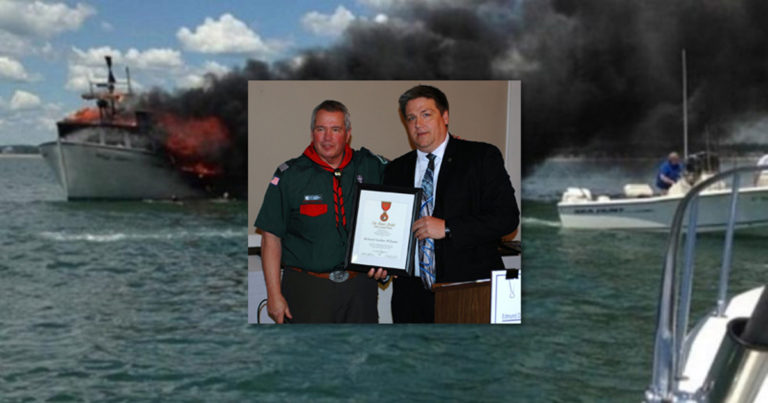When boat burst into flames, Scouting helped him save three lives (including his own)

 For Dick Williams, the decisive moment came during a casual fishing trip on the Long Island Sound.
For Dick Williams, the decisive moment came during a casual fishing trip on the Long Island Sound.
In the distance, Williams and his cousin watched as a 40-foot clam boat burst into flames. The fire started in the cabin and was spreading fast.
The men could call 911 and wait for the Coast Guard or someone else to rescue the passengers. Or they could do it themselves.
Williams and Tony Della Monica Jr. maneuvered their 20-foot boat to the scene and saw that all three passengers had abandoned ship.
One got away safely, but the other two were trapped by wind and the water’s strong current. They were being pushed toward the burning hull of their boat.
What happened next was a testament to Williams’ bravery, his willingness to sacrifice his life to save a stranger and his Scout training. Three years after the heroic event, Williams received the Honor Medal With Crossed Palms. It is Scouting’s highest award for bravery, presented to a Scout or Scouter for “saving or attempting to save life at extreme risk to self.”
Williams also received a Carnegie Medal, a national heroism award. The Pittsburgh-based Carnegie Hero Fund has honored 9,934 people — less than 90 a year — since the award’s inception in 1904.

Boat parts and clams
The date was June 7, 2014 — a Saturday. The place: the Long Island Sound near Milford, Conn.
Two passengers from the doomed ship were still in the water, struggling to stay afloat. They were dangerously close to their burning ship and its 500 gallons of diesel fuel.
Flames and thick black smoke reached skyward.
“Boat parts and clams flew through the air around us,” Williams said.
Williams and his cousin edged closer to the two men. It’s then that Williams heard a voice — but it wasn’t from anyone physically present.

The moment of rescue
“Reach, Throw, Row, Go.”
Williams could hear his late Scout leader Henry Decho and Decho’s son, Jay. They were chanting those four words — the recommended order for a water rescue. Henry and Jay had repeated those words again and again as they taught water-related merit badges like Swimming, Lifesaving, Rowing and Canoeing.
“Throughout the rescue I kept ‘hearing’ Henry and Jay yelling, ‘Reach, Throw, Row, Go,’” Williams said.
When they got closer and saw the two passengers submerge and resurface again and again, Williams’ instinct was to jump right in.
His cousin, also a Scouting alumnus, must’ve had the same thought, because Williams saw Della Monica lunge forward and stop himself.
Instead of jumping to “Go” — the last resort in a water rescue — Williams threw a rope line to the men.
He then backed his boat away slowly, pulling the men to safety. They got clear just as small explosions on the burning boat threw more debris into the water.
One of the burning boat’s passengers was hospitalized for two weeks for treatment of burns. He, along with the other two passengers, made a full recovery.
Not two lives saved but three or four
Back on dry land, Williams and Della Monica talked as they ate lunch. They agreed that they could’ve died that day. Had Williams followed his instincts instead of his Scout training, he would’ve jumped into the water and possibly become a victim himself.
“If we had not received Scout merit badge training many years ago, I know that I, for one, would have gone overboard, most likely with horrendous results,” Williams said. Had they both jumped in, there would be “four people in the water instead of two. None of us might have made it.”
Williams, a member of the BSA’s Housatonic Council, understands that Scouting saved his life that day, too.
“And hopefully I’m better prepared — if there is a next time — to practice Scout skills,” he said.
When boat burst into flames, Scouting helped him save three lives (including his own)
